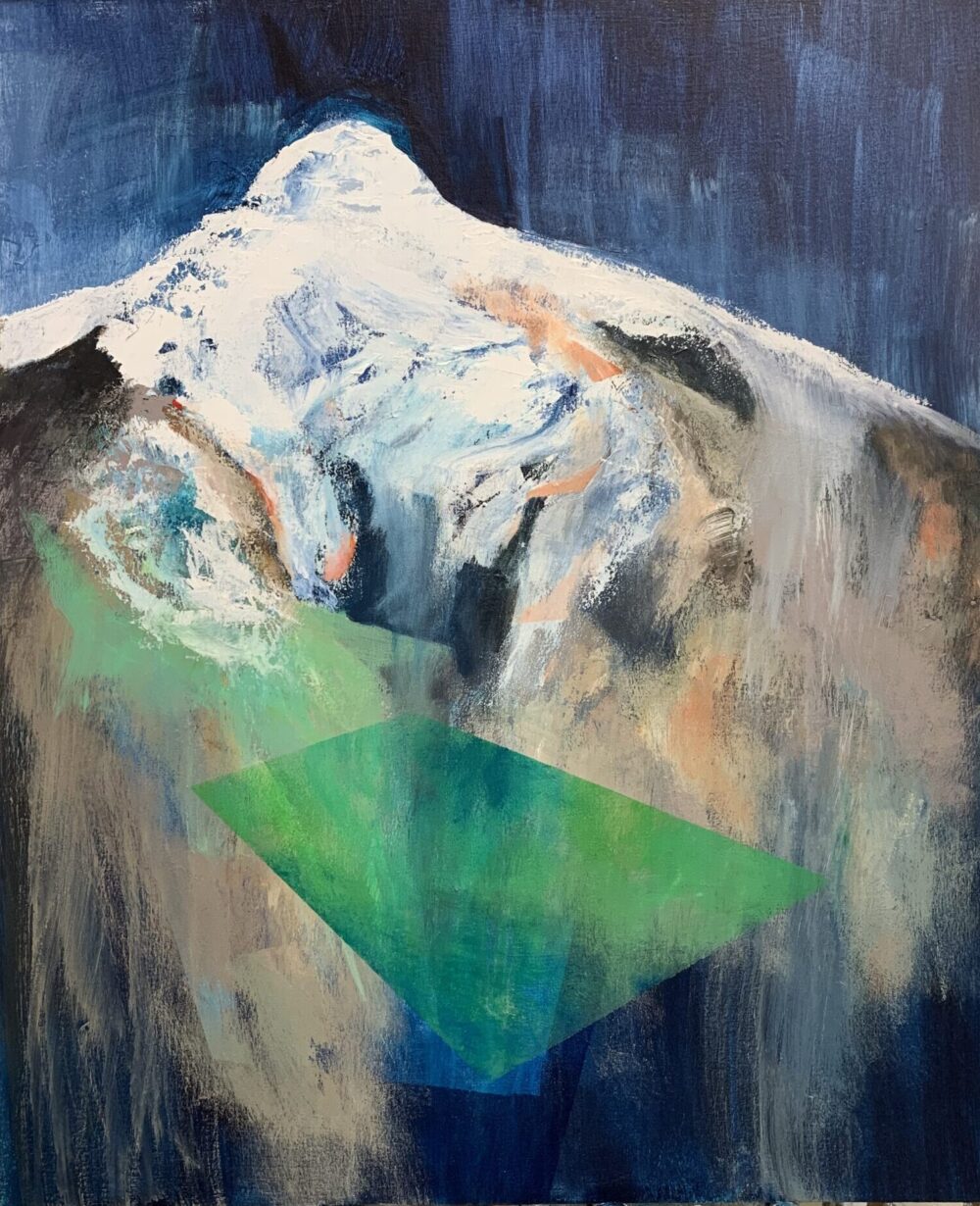
"Recently Exposed" is a piece by Associate Professor of Art Betsy Ruth Byers on display in the new exhibit.
Gustavus professors Priscilla Briggs and Betsy Ruth Byers will be featured in a joint exhibit at the Rosalux Gallery in Minneapolis opening this weekend. Their work was created in collaboration with recent graduates Jenna Brouse ’08 and Emily Dzieweczynski ’19.
In Reading Between the Lines, Briggs and Brouse mine the media for materials to address the current political state of affairs in an array of works that employ collage and text. In Reservoir, Byers and Dzieweczynski ’19 present work inspired by their on-going project investigating tropical glaciers in Ecuador with a National Science Foundation interdisciplinary research team. They use sensory stimuli throughout the gallery to create an immersive and visceral experience with the Hermoso Glacier on Volcán Cayambe, bringing something that is analyzed to something that is felt.
The public is welcome to attend an opening reception Saturday evening from 7-10 p.m. Both exhibits are open through March 29 and the gallery is open Saturdays and Sundays 12–4 p.m.
Reading Between the Lines
Briggs collaborates with Brouse to create singular works that address contemporary political issues such as the current democratic primary, the spectacle of war, and age-old divide and conquer strategy reimagined. The works include a series of zines as well as collages created with imagery sourced primarily from news magazines. One interactive piece invites the viewer to participate in protest.
About the Artists
Priscilla Briggs works with photography to investigate globalization and environmental justice. Recently, she has been interested in the political landscape closer to home. Her work has been exhibited internationally, at venues such as the Landskrona Photo Salon in Sweden, the National Museum of Modern and Contemporary Art in Seoul, the Ullens Center for Contemporary Art in Beijing, the National Gallery of Victoria in Melbourne, the Minneapolis International Film Festival, the Louisville Photobiennial, and the Living Arts New Genre Festival in Tulsa, OK. Her artist monograph, Impossible Is Nothing: China’s Theater of Consumerism, was published by Daylight Books. Priscilla is currently a professor of Studio Art at Gustavus.
Jenna Brouse graduated from Minneapolis College of Art and Design with a BFA in Graphic Design. She is a 2008 graduate of Gustavus. Her work has been published in the New York Times, the very news magazine from which much of the source material for this project came. Jenna is currently a special education teacher in Chanhassen.
Reservoir
As a collaborative team, Byers and Dzieweczynski pair glaciological and psychological research to create interactive and immersive art spaces that promote empathy between humans and the environment. Their current work employs virtual reality and sensory stimuli to place viewers in distressed environments of receding glaciers. Reservoir explores the impact of climate change on the hydrological system at Volcán Cayambe in Ecuador. Byers and Dzieweczynski use auditory, olfactory, and visual characteristics observed at the Hermoso glacier on Cayambe during a National Science Foundation research trip in June of 2019 to offer viewers a bodily experience of the tropical glacier.
Collaborating with scientists gave the artists a significant opportunity to observe first-hand the collection of scientific data and to partner directly with colleagues working in the field. This project purposefully overlaps the boundaries between art and science, aiming to delineate the ways in which the fields of science and art intersect to mutually benefit one another. Art can offer a subjective place to explore concerning viewpoints that are often an immediate consequence to learning about scientific data regarding climate change. Viewers will be encouraged to explore with all of their senses throughout the gallery and ultimately, to reflect on what it means to be a glacier in today’s world of rising global temperatures and increasing melt.
The work in this exhibition is supported by the National Science Foundation under Grant No. 1758854. The interdisciplinary team consists of principal investigators Dr. Jeff LaFrenierre, Dr. Crystal Ng, Dr. Daniel Stanton, Dr. Andrew Wickert, and Dr. Li Li. Any opinions, findings and conclusions or recommendations expressed in this material are those of the artists and do not necessarily reflect the views of the National Science Foundation.
About the Artists
Betsy Ruth Byers is an artist and an associate professor at Gustavus Adolphus College. She holds a Master of Fine Arts from the Minneapolis College of Art and Design. Her work has been exhibited at the National Galleries of Scotland, SCOPE International Art Fair, the Minnesota Museum of American Art, DeVos Art Museum, Hillstrom Museum of Art, Target Gallery at the Torpedo Factory, University of Connecticut, Intermedia Arts, Guilford Art Center and The Soap Factory. Her work resides in several private, corporate, and museum collections including the Weisman Museum of Art, Hillstrom Museum of Art, Target Corporation, Nordstrom Corporation, BMO Harris Bank, LPM Corporation, Minnesota Vikings LLC, and Allina Health Center.
Emily Dzieweczynski is an emerging multimedia artist in Minnesota, working across art, science, and technology to understand how we empathize. She is a recent graduate from Gustavus Adolphus College, holding bachelor’s degrees in studio art and psychological science. She also studied fine arts media at the Slade School of Fine Art in London, England. Emily has explored physical mediums such as printmaking and drawing, and has increasingly become interested in digital platforms such as video, sound, animation, and virtual reality. Emily’s work has been shown at the Children’s Museum of Minnesota, the Children’s Museum of Southern Minnesota, Highpoint Center for Printmaking, The American Swedish Institute, The Target Gallery, Gustavus Adolphus College, and Bethany Lutheran College. Emily has received funding through an Arts and Cultural Heritage Grant, a Presidential Creative Research Grant through Gustavus Adolphus College, and the National Science Foundation.